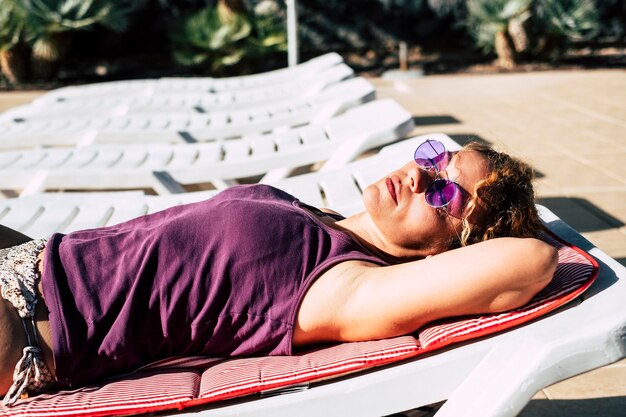Are Tanning Beds a Hidden Cancer Risk? What You Need to Know
In recent years, the desire for a sun-kissed glow year-round has driven many to tanning salons. Yet, as you lay in that ultraviolet cocoon, you may wonder: at what cost does this bronzed look come? Let's delve into whether tanning beds cause cancer and explore related topics that illuminate this pressing issue.
The Science Behind Tanning Beds
Tanning beds emit ultraviolet (UV) radiation, primarily UVA and UVB rays, to darken the skin. These rays penetrate the skin, triggering melanin production—the pigment responsible for tanning. While this process gives your skin a golden hue, the interaction of UV rays with skin cells can lead to mutations. Over time, these mutations may contribute to the development of skin cancer.
UVA vs. UVB: What's the Difference?
- UVA rays penetrate deeper into the skin layers, leading to long-term skin damage and aging.
- UVB rays primarily target the skin's surface and are more associated with causing sunburn.
Both types of rays can damage skin cells and potentially lead to cancer, making it crucial to understand the nature of exposure.
Understanding Skin Cancer
There are three primary types of skin cancer to be aware of:
Basal Cell Carcinoma: The most common form, often appearing as a pearly bump, primarily caused by cumulative sun exposure.
Squamous Cell Carcinoma: Appears as scaly patches and is more likely to grow into deeper layers of skin if unchecked.
Melanoma: The deadliest form that may develop anywhere on the body. It's less common but more aggressive.
How Do Tanning Beds Contribute?
Research suggests a strong correlation between tanning bed use and the risk of all three skin cancers, especially melanoma. The concentrated exposure to UV radiation hitting your skin in a short time frame intensifies the risk—nearly doubling it in some studies compared to individuals who never used a tanning bed.
Risks Beyond Skin Cancer
While skin cancer may be the headline risk associated with tanning beds, other health issues exist:
Premature Aging: Repeated exposure to UV rays speeds up skin aging, resulting in wrinkles and loss of elasticity.
Eye Damage: Without protection, UV rays can lead to cataracts and other eye diseases.
Immune Suppression: Excessive exposure to UV radiation can suppress immune functions, affecting the skin’s natural defenses.
The Myth of the "Base Tan"
A widely held belief is that acquiring a "base tan" helps prevent sunburns—this is misleading. A tan itself means skin damage has already occurred. Furthermore, the protection one might mistakenly attribute to a base tan is equivalent to a low SPF sunscreen, leaving you vulnerable.
Tanning Beds vs. Sun Exposure
Are tanning beds actually worse than the sun? This question often arises. When considering cancer risk factors in tanning beds versus the sun, several distinctions emerge:
Intensity: Tanning beds often deliver a more intense and concentrated UV exposure than typical sunlight.
Duration: While sunlight exposure varies throughout the day, a tanning session exposes individuals to constant UV levels.
Control: Sunlight exposure can be managed with shade, clothing, and timing, while tanning bed exposure is direct and constant.
Regulatory Measures and Public Awareness
Some countries and states have recognized the dangers of tanning beds. Regulations vary, with some regions imposing age restrictions or banning tanning beds altogether for minors. These measures highlight a growing acknowledgment of potential risks associated with artificial tanning.
How Awareness Helps
Increased awareness can drive safer practices, such as:
- Choosing alternatives, like self-tanning lotions.
- Using UV-protective eyewear.
- Limiting tanning bed usage.
Alternatives to Achieve a Radiant Glow
If you’re after that bronzed look without the associated risks, consider the following:
Sunless Tanners: Lotions or sprays can provide a tan without UV exposure.
Bronzing Makeup: Provides an instant yet temporary glow.
Diet and Skin Care: A healthy diet rich in vegetables and hydration can naturally enhance skin appearance.
What the Experts Say
Medical professionals unanimously advise caution. They emphasize that no tan is worth the risk of cancer. Public health campaigns often underline the message that embracing one’s natural skin tone and protecting skin health is the best choice.
Empowering Your Decision
Empowering yourself with accurate information allows you to make mindful decisions about your health. Here’s how you can take a proactive approach:
- Evaluate Your Skin Type: Understand your risk and susceptibility to UV damage.
- Consider Lifestyle: Balance your desire for tan skin with the long-term effects on health.
Final Takeaway
Awareness and understanding of the risks associated with tanning beds can help change habits for safer alternatives. Remember, the quest for beauty should not compromise health. By staying informed and vigilant, you can enjoy healthy skin and make wise choices for your wellbeing.
Here's a handy summary of practical tips:
🌟 Key Takeaways 🌟
- UV Exposure Matters: Both tanning beds and the sun emit harmful UV rays that can cause skin cancer.
- Health First: Prioritize skin health over aesthetic preferences.
- Explore Safe Options: Use sunless tanners or bronzing makeup for a UV-free tan.
- Stay Informed: Awareness is key to making safe decisions regarding skin exposure.
👉 Choose your glow wisely and protect your skin! 🌞💪

Related Articles
- Are Breast Cancer Lumps Painful
- Are Chills a Sign Of Cancer
- Are Colon Spasms a Sign Of Cancer
- Are Lytic Lesions Always Cancer
- Are Polyps Cancer
- Can a Blood Test Detect Cancer
- Can a Ct Scan Detect Cancer
- Can a Dexa Scan Show Cancer
- Can a Gastric Emptying Scan Show Cancer
- Can a Lung Biopsy Cause Cancer To Spread
